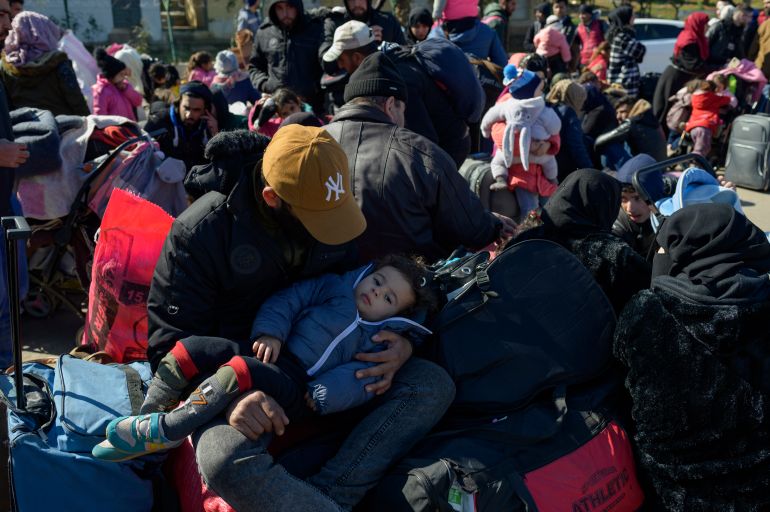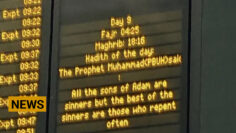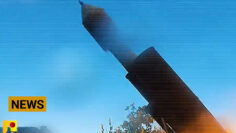
Turkey-Syria updates: Death toll surpasses 46,000
This live blog is closed, thanks for joining us. These were the updates on the Turkey-Syria earthquake on Saturday, February 18:
- Death toll from the Turkey-Syria earthquakes passes 46,000.
- The number of people killed in Turkey has hit 40,642. The Syrian government and the UN say more than 5,800 people have died in Syria.
- Rescue teams in Turkey’s Hatay rescued a 45-year-old man alive after he spent 278 hours under the rubble.
- A total of 178 UN trucks carrying aid from Turkey into northwest Syria have crossed the border since February 9.
- Turkey is caring for 1,589 children who have been separated from their families following the earthquakes.
Baby girl rescued in northern Syria reunited with aunt
An infant child born in northern Syria during this month’s devastating earthquake has been reunited with her aunt and uncle, after her parents and siblings died in the disaster.
Footage circulating widely on social media after the quake showed a rescuer scrambling down a hill of rubble carrying a tiny dust-covered baby.
The newborn was later identified as the child of Abdallah and Afraa Mleihan, who died in the earthquake along with their other children in the rebel-held town of Jandaris in Syria’s Aleppo province.
On Saturday, her paternal aunt Hala and uncle by marriage Khalil Al-Sawadi finally picked up their niece – whom they named Afraa, after her deceased mother.
Turkish internet lashes out at government after deadly quake
Grieving internet users are sharing old tweets and videos embarrassing for the Turkish government after last week’s disastrous earthquake.
One clip shows President Recep Tayyip Erdogan congratulating officials for adopting an amnesty law in 2018 forgiving faults in nearly six million buildings that failed safety regulations.
Filmed during rallies in Hatay, Kahramanmaras and Malatya, all areas badly affected by the February 6 disaster, Erdogan boasted that he had “solved the problem” for residents to stay in their homes.
Those comments, while well-received by people who avoided losing their homes at the time, now look ill-conceived.
Experts say that contractors’ failure to comply with building codes in the earthquake-prone region explains the huge death toll.
“Buildings kill people, not earthquakes. We must learn to live with earthquakes … and take measures accordingly,” Erdogan tweeted in 2013, when he was prime minister.
That tweet has now been shared thousands of times.
84,000 building have collapsed or were severely damaged: Turkish officials
More than 84,000 buildings have either collapsed, need urgent demolition or were severely damaged in the quake, Turkish officials have said.
One of the areas severely hit was Antakya, an ancient crossroads of civilisations.
The city has suffered several earthquakes – almost one every 100 years – and is no stranger to rebuilding.
WFP: Operations being hampered in northwestern Syria
The head of the World Food Programme (WFP) has urged authorities in northwestern Syria to stop blocking access to the area as it seeks to help hundreds of thousands of people ravaged by earthquakes.
WFP Director David Beasley has said the agency was running out of stocks there and called for more border crossings to be opened from Turkey.
“The problems we are running into [are with] the cross-line operations into northwest Syria where the northwestern Syrian authorities are not giving us the access we need,” said Beasley on the sidelines of the Munich Security Conference.
In Syria, already shattered by more than a decade of civil war, the bulk of fatalities have been in the northwest.
The area is controlled by insurgents at war with forces loyal to President Bashar al-Assad which has complicated efforts to get aid to people.
Growing anger in Turkey over flawed, corrupt building practices
For families still waiting to retrieve relatives in Turkey, there is growing anger about what they see as corrupt building practices and deeply flawed urban development that resulted in thousands of homes and businesses disintegrating.
One such building was the Ronesans Rezidans (Renaissance Residence), which keeled over in Antakya, killing hundreds.
“It was said to be earthquake-safe, but you can see the result,” said Hamza Alpaslan, 47, whose brother had lived in the block. “It’s in horrible condition. There is neither cement nor proper iron in it. It’s a real hell.”
Turkey has promised to investigate anyone suspected of responsibility for the collapse of buildings and has ordered the detention of more than 100 suspects, including developers.
Damaged sanitation infrastructure leads to rising concern about spread of infection
Medics and experts have voiced concerns about the possible spread of infection in the areas where tens of thousands of buildings collapsed last week, leaving sanitation infrastructure damaged.
Turkish health minister Fahrettin Koca said on Saturday that although there had been a rise in intestinal and upper respiratory infections, the numbers did not pose a serious threat to public health.
“Our priority now is to fight against the conditions that can threaten public health and to prevent infectious diseases,” Koca told a news conference in southern Hatay province.
Aid organisations say the survivors will need help for months to come with so much crucial infrastructure destroyed.
Search and rescue operations will largely be over on Sunday evening: AFAD
Yunus Sezer, the head of the Disaster and Emergency Management Presidency (AFAD), told reporters that search and rescue efforts will be “largely completed as of Sunday evening”.
A total of 11,488 international search and rescue units from 80 countries have come to the disaster zone to provide support, he said.
Noting that evacuations from the earthquake zone to other provinces continued, Sezer said that more than 430,000 people have been evacuated so far.
“We are currently hosting 313,720 victims in public guesthouses, hotels and other accommodation facilities,” he said.
He added that the cash aid of 10,000 Turkish lira ($531) has been made to more than 682,000 citizens.
More than one million people live in tent encampments in Turkey
While the exact number of displaced people across southern Turkey is unknown, there are more than one million living in tent encampments.
“When you consider 13.5 million people across southern Turkey have been impacted by this disaster, you get a sense of the enormous challenge the Turkish government will face,” said Al Jazeera’s Natasha Ghoneim, speaking from the city of Adana.
“There is no figure yet as to how many people are now homeless as a result of the earthquake but we do know that the government has provided shelter to 1.6 million people.”
People are waiting to see where they will be housed or for an inspector to deem their homes either structurally sound or too damaged to live in.
“There’s a lot of feelings of hopelessness and helplessness,” Ghoneim said. “The government said 75,000 buildings in Turkey have been destroyed or damaged; another almost mind-numbing statistic that gives you the sense of a colossal needs people will have in the coming weeks and months.”
Nearly 6,500 babies born in southern Turkey since twin quakes
Nearly 6,500 babies have been born in southern Turkey since twin earthquakes shook the region earlier this month, the Turkish health minister said.
A total of “6,447 babies have been born in the earthquake region since the first day of the disaster. Every child born is a hope,” Fahrettin Koca said at the Disaster and Emergency Management Presidency (AFAD) Coordination Center in the southern province of Hatay.
Wishing the babies a good and long life, Koca said that “the necessary health services are provided to the babies and their mothers without interruption”.
Regarding maternity care, the health minister said that 10,489 pregnancy observations were conducted in the earthquake-hit region, and the number of postpartum follow-ups was also more than 10,000.
He said more than 10,000 neonatal heel pricks – a blood collection procedure on newborns – were done, more than 5,100 babies were screened for spinal muscular atrophy (SMA), and 154,212 vaccine doses were administered as part of childhood immunisation services.
Austria expresses full solidarity with Turkey after quakes
The Austrian foreign minister has voiced full solidarity with Turkey after the deadly earthquakes.
“Our hearts go out to all the families who have suffered, who have lost loved ones,” Alexander Schallenberg told Anadolu Agency during the Munich Security Conference.
“This is a catastrophe, and there’s one thing which is needed, and it’s full solidarity. The Turkish people can count on us, our solidarity,” Schallenberg stressed.
He noted that Austria had sent search and rescue teams to Turkey immediately after the February 6 earthquakes and provided humanitarian assistance for victims.
Death toll in Turkey surpasses 40,000
The number of people killed in Turkey from the February 6 devastating quakes has risen to 40,642, the head of the country’s Disaster and Emergency Management Authority (AFAD) Yunus Sezer said.
The UN and Syrian government said more than 5,800 people died in Syria, pushing the total death toll to more than 46,000.
In Kahramanmaras, residents have mammoth task of rebuilding their lives
In the Turkish city of Kahramanmaras, which was the epicentre of the first 7.8-magnitude quake, people are now in the transition phase of looking to rebuild their lives.
Many have been put up in tent cities, said Al Jazeera’s Assed Baig, where vital humanitarian aid is being delivered to them.
“Schools are being used to give out blankets, food, water – anything that people may need,” Baig said, reporting from the city.
“There is rubble absolutely everywhere. Amongst the concrete and twisted metal there are people’s homes, former lives where you can see mattresses, books, clothes … all the contents of their homes crushed in a matter of minutes.”
People have been going through the rubble trying to recover anything that they can, Baig added.
“After this is all settled, many of these people will have to rebuild their lives,” he said. “They won’t be able to go back to their homes either because they’re completely destroyed or so damaged that they are unsafe.”
Greece eager to using post-quake ‘opportunity’ to mend ties with Ankara, says official
Following the post-earthquake international show of solidarity, Greece said that it wanted to use the “window of opportunity” to reduce tensions between the two countries.
“The reception of Greek aid and the Greek flag by Turkish society opens a window of opportunity to reduce the tension in the relations between the two people,” deputy foreign minister Miltiadis Varvitsiotis told private broadcaster Action 24.
“We want to take advantage of this window of opportunity,” he said, noting that there could be a detente in bilateral relations.
UAE and Saudi Arabia continue humanitarian aid for quake victims
The United Arab Emirates (UAE) and Saudi Arabia continued their humanitarian assistance for the victims of the earthquakes.
The UAE dispatched 39 aid planes to Turkey and 58 planes to government-controlled areas in Syria, carrying 2,624 tonnes of foodstuffs, medical supplies and tents since the disaster, the state news agency WAM reported.
“UAE search and rescue teams continue efforts to search for survivors under debris using quality equipment,” WAM said.
Meanwhile, Saudi Arabia sent its 12th aid plane to Gaziantep Airport in southern Turkey carrying 75 tonnes of foodstuffs, and shelter and medical materials.
The kingdom also sent two aid planes and 10 trucks loaded with 80 tonnes of food and shelter supplies for quake victims in northern Syria.
Following the disaster, the King Salman Humanitarian Aid and Relief Center launched a donation drive on February 8 for the earthquake victims in both Turkey and Syria.
More than 362 million riyals (nearly $96m) have been collected so far as part of the drive, according to the Saudi government’s Sahem Platform, which is responsible for the donation campaign.Advertisement
Germany will not forsake earthquake victims, Scholz says
Germany will stand by the earthquake victims in Turkey and Syria as they battle the aftermath of the disaster, Chancellor Olaf Scholz said in a video message released on government channels and his Twitter feed.
“We cannot undo the disaster. But we can help in times of need. And Germany is helping,” Scholz said, citing a Turkish proverb in the original wording and then translating: “You recognise a true friend in times of need.”
“And we are true friends. As friends, we share your pain and as friends, we will not leave you alone in adversity.”
The video message was captioned in Turkish as well as Arabic on the chancellor’s Twitter channel, and there were also tweets in Turkish as well as Arabic.
About three million citizens in Germany have Turkish roots, including from the particularly badly damaged provinces of Hatay and Gaziantep.
WFP boss warns of bottlenecks in northwest Syria, cash running out
Local authorities in northwestern Syria are not giving the required access to the UN food agency, the head of the World Food Programme (WFP) said, warning that the agency only had money left for about 60 days in its earthquake response programme.
“The Syrian and Turkish governments are really cooperating and are giving us the access we need to cross the border, but the problems we are running into is the cross-line operations into northwest Syria where the northwestern Syrian authorities are not giving us the access we need,” WFP Director David Beasley told Reuters on the sidelines of the Munich Security Conference.
“That is bottlenecking our operations. That has to get fixed straight away.”
Ghanaian footballer Atsu’s body found under Turkey quake rubble
Ghanaian footballer Christian Atsu, 31, has been found dead in southern Turkey under the rubble of the building he lived in, after last week’s massive earthquakes, his Turkish agent and club said on Saturday.
The former Premier League player, who joined Turkish club Hatayspor last year, had been missing since the February 6 earthquakes devastated southern Turkey and northwestern Syria.
“Atsu’s lifeless body was found under the rubble,” agent Murat Uzunmehmet told reporters in Hatay.

Three rescued in Turkey’s Hatay province 13 days after quake
Turkish rescuers have pulled three people, including a child, alive from the rubble, 13 days after a massive earthquake killed tens of thousands of people, local media reported.
The man, woman and child were transferred to ambulances after spending 296 hours buried under the Kanatli apartment block in Antakya, the capital of Hatay province.

Turkey’s Elbistan, the epicentre of the second quake, a ‘ghost town’
Reporting from Turkey’s southeast city of Elbistan, Al Jazeera’s Stefanie Dekker said that it resembles a ghost town.
“We haven’t seen a single building standing. Nothing remains liveable here,” she said. “A lot of its residents have left, and there are not many tents here. Many residents complained that help didn’t come fast enough.”
The city, nestled between snow-covered mountains, was at the exact epicentre of the second 7.6 magnitude quake.
“Now it is only about recovering bodies,” Dekker said. “It seems that the work to rebuild this area has already been begun but at the moment, the devastation remains beyond comprehension.”

Schools damaged, education suspended in Syria’s rebel-held areas
Children in rebel-held Syria’s northwest cannot return to school until the buildings are deemed safe, but it is not clear when that will be.
“We are afraid of more aftershocks that may lead to more damage in the future,” said Jalal Wehbe, the principal of the Marayan Boys School.
“I urge the concerned parties to help us continue the education process here for the sake of the children,” he added.
Thousands living in student dormitories across Turkey: AJ correspondent
Al Jazeera’s Sinem Koseoglu reporting from Turkey’s capital Ankara says thousands affected by the earthquakes are staying temporarily in student dormitories.
“There are more than 200,000 being accommodated in the facilities of the sports ministry, including dormitories, guest houses and sports halls,” she said, speaking from a student dorm in Ankara.
“Some people are using this dormitory as a refuge for longer stays while others are using it for transit purposes … if they want to move to another city or live next to their relatives.”
Ghanian footballer Atsu’s body found under rubble: Agent
Ghanaian footballer Christian Atsu has been found dead under the building where he lived in southern Turkey after last week’s massive earthquake, the ex-Chelsea winger’s Turkish agent said.
“Atsu’s lifeless body was found under the rubble,” Murat Uzunmehmet told reporters in Hatay, where the athlete’s body was found.
“Currently, more items are still being taken out. His phone was also found.”
The 31-year-old player’s Ghanaian agent also confirmed the news on social media.
“I ask that whilst we make the necessary arrangements, that everyone would please respect the privacy of the family during this very difficult time,” Nana Sechere posted.

Syrian girl who laughed at bombs displaced in Turkey earthquake
The massive earthquake that rocked the southern Turkish city of Antakya on February 6 flattened entire residential blocks as well as the sense of security that the family of Abdullah al-Mohamed had taken so long to rebuild.
In 2020, the Syrian family was forced to move from their hometown of Saraqeb, as government forces battled to reclaim control of Idlib province, to the town of Sarmada on the border with Turkey.
The family eventually moved to Antakya. But three years after father and daughter exorcised death with laughter, their life in Turkey was shattered by a series of violent tremors.
ICRC says aid blocked from Damascus
The International Committee of the Red Cross (ICRC) has appealed for aid deliveries from Damascus to be allowed to pass through to the largely opposition-held northwest of the country.
“We tried to get into Idlib through crossline and so far we’ve been blocked, unfortunately,” Fabrizio Carboni, ICRC regional director for the near and middle east, said on Friday.
“So, I don’t have first-hand information on the roads and access but we’re ready to get in but we are so far blocked to do crossline, hoping that this could change soon,” he said in Geneva, according to a United Nations news briefing.

People walk past damaged buildings, in the aftermath of an earthquake, in the rebel-held town of Jandaris, Syria [Khalil Ashawi/Reuters]
Bodies of more than 1,500 Syrians repatriated from Turkey
The bodies of at least 1,522 Syrians have been brought back to Syria from Turkey for burial, an official at the Bab al-Hawa border crossing said.
Syrian survivors of the earthquake have also begun crossing back from Turkey. Some 1,795 Syrians crossed from Turkey into Syria on Wednesday, the first day after Turkey agreed to allow Syrian refugees affected by the earthquake to return to their country temporarily without losing their protected status in Turkey, the border-crossing official said.
The decision allows Syrian holders of Turkish temporary protection cards residing in earthquake-damaged areas to cross into Syria without having to obtain a travel permit from Turkish authorities.
Normally, Turkey would consider Syrians holding protected status who crossed into Syria without a permit to have relinquished their status as asylum seekers and they would be prevented from re-entering Turkey for five years.









